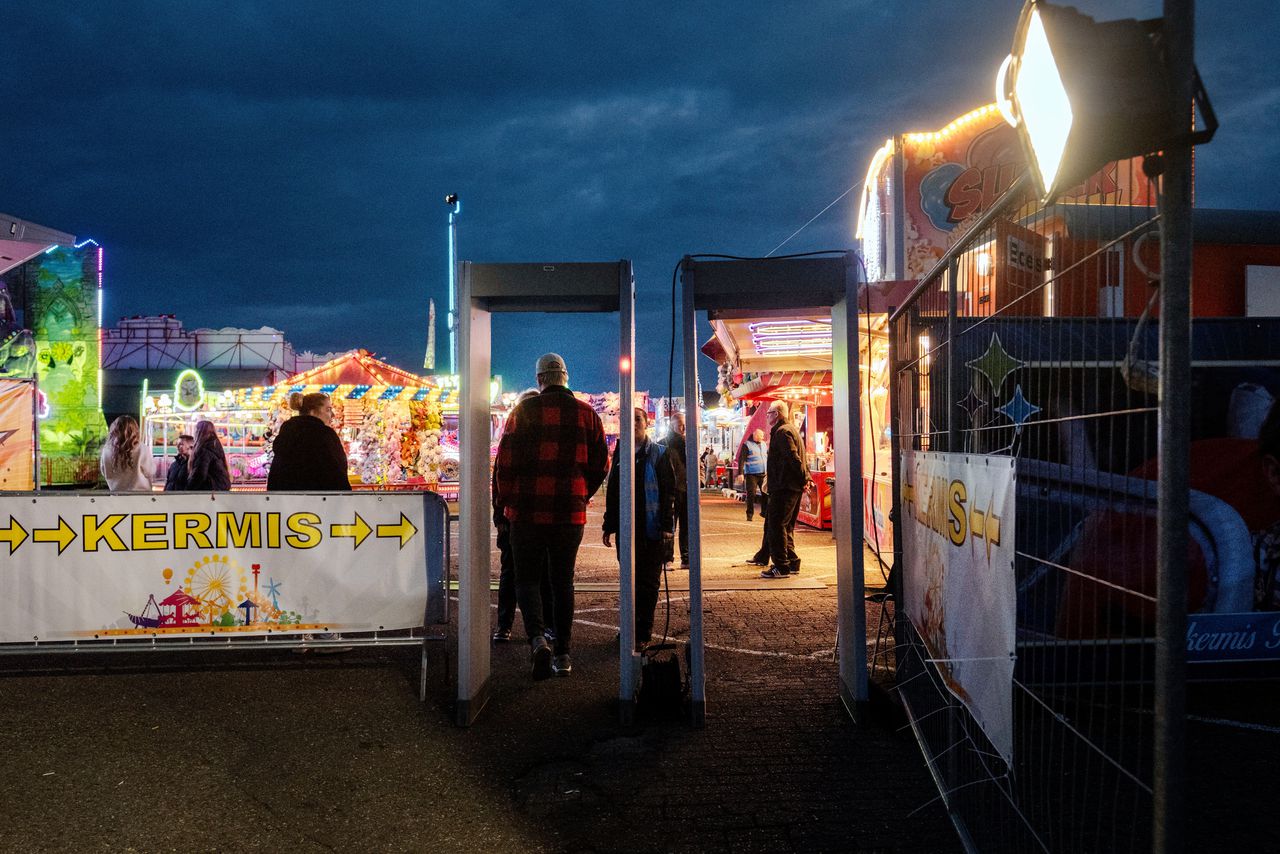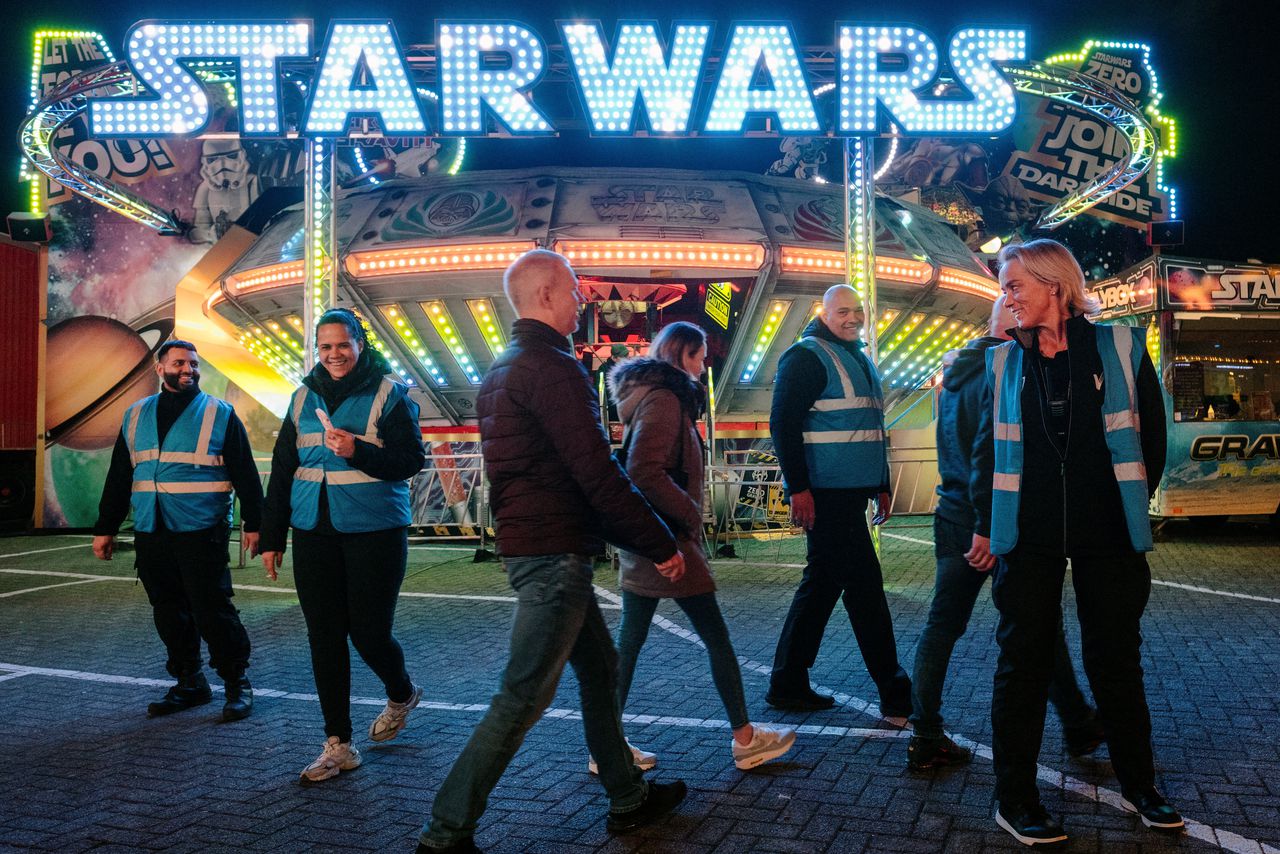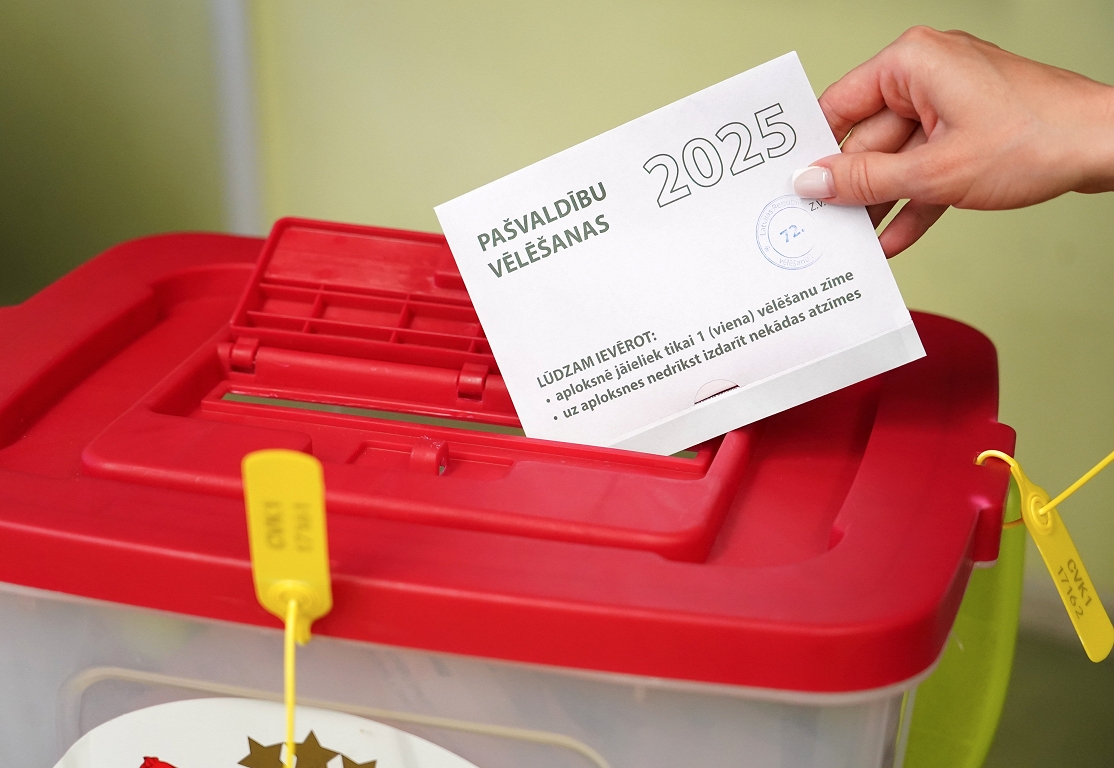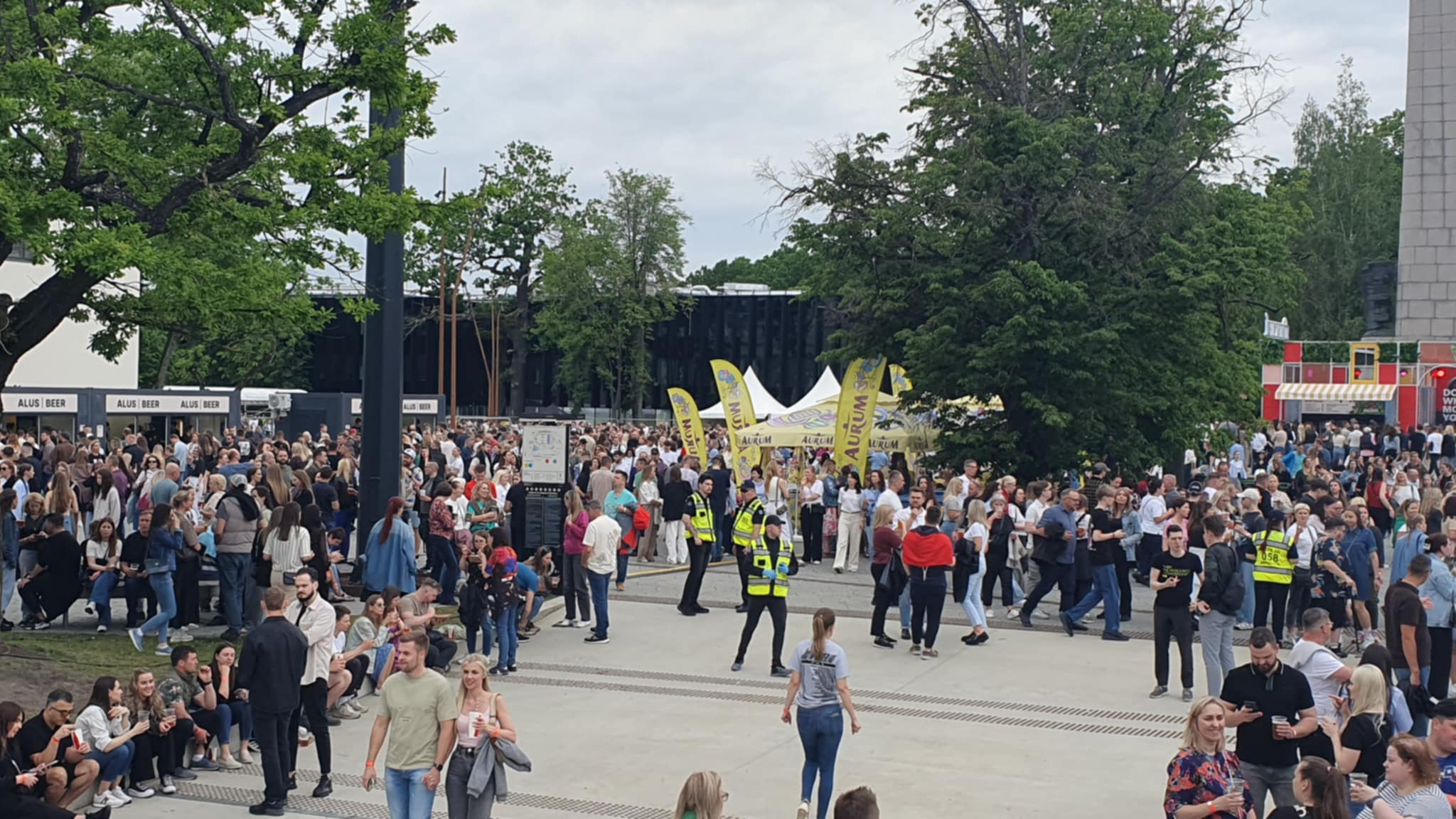At the fair you first go through the detection feat and then to the bumper cars

Beep, beep, squeak peak. « Yes, just stand here, » says the security guard at the fair in Beverwijk to a teenager with curls, jogging pants and sneakers. He just walked through a detection gate. « Coat open, arms apart. » He feels the boy’s back, he slides his hands along his legs. « Now open your bag. »
Nothing to see. He can continue.
« Wait, » Jake Hampel, the boss of security company BJ Security & Protective Services. « This is a group leader who stood out negatively last night. We will have a conversation with him. » The boy is told: if you are annoying tonight, you can’t go on the fair all week.
Then another boy with hat comes in jogging pants. He snarls: « He didn’t do anything man. » Hampel: « No, you love it. » The boy shouts: « Take a calm man, do it quietly! » Hampel Fel: « You have to do calmly and not talk to me so much. » Not much later, the boy outside the fair is watching how his friends disappear into the turmoil of rotating attractions, uplifting music and flashing lights.
The fair season has started and visitors will notice that fairs are being protected. By hired security companies and not by the police – they are for public order but not for safety at a private event. Moreover, it is a hard requirement from municipalities: no security, not a permit. How much supervision there is depends on the size of the fair and the place. At a fair at a village festival in Helmond, a few surveillers walk around, in the Randstad such as in Beverwijk, more is needed. Here you see: fences around the fair, metal detection gates, poles with cameras spread over the site. And security guards with radios everywhere.
And that is not for nothing. In recent years there have been serious incidents on and around fairs. The fair in Houten had to close earlier last week because the police were afraid of disturbances. Last year young people there threw fireworks there, the year before with bricks. Two weeks ago, fifty young people fought each other at a fair in Apeldoorn.
And last year things went wrong in Etten-Leur, Heerhugowaard, Groningen, Emmeloord, Rotterdam, Alphen aan den Rijn, Weert, Terborg, Gennep, IJsselstein, Duiven, Dordrecht. All fighting young people, against each other and against the police. Hans van Tol, board member of Kermisbond Bovak, wants to nuance it: it is generally going well. « We have to pay extra attention to 10 to 15 percent of the 4,000 fairs in the country. » In the 42 years that he and his attraction ‘the spider’ (where gondolas on a rotating arm fly in all directions), he has never experienced anything serious.
Knives in jacket pockets
This is different for entrepreneur Frans Stuy. He has been organizing fairs for thirty years and in 2022 things went wrong in Osdorp. Young people threw fireworks at the police, they fought with each other and care providers were attacked. The ME was added. « As soon as that happens, the fair died, » says Stuy. « No parent who lets his child go there. » Since then, Stuy has his fairs protected by Jake Hampel. Last in Amsterdam Westerpark, now in Beverwijk. And that is excellent, he says. « No hassle, good atmosphere. »
On an iron plate next to the bumper cars are two boys of seventeen from Krommenie. They call Beverwijk a ghetto, « but here it is just relaxed. » They sometimes hear stories about twelve -year -olds with machetes. « So I understand the security. » True, security guards, also with young boys, with every fair ten to fifteen knives from jacket bags, Hampel says. But it is getting less and less. « The detection gates deliver returns. »
That is also the experience of Jordy Grijpink from Security Services Netherlands. He has been protecting around twenty fairs a year for five years, largely in the Randstad. He has taken kaps, screwdrivers, kitchen knives and stanleym lessons. « The number is decreasing. »
« The youth is not doing well, » says Stuy, looking at a stall with a stall with freshly baked churros at the dripping audience. « You also read it in the media: children who stab each other, young people who have weapons at school. » According to him, it is the fault of the coronation time. « Young people were locked up. We could not reach them, not help them and not keep an eye on. » In 2019, Stuy received the Andreasenning, an award from the municipality of Amsterdam, because he is committed to disadvantaged young people. He trains them and gives them work at the fair or at other events. « Now the children have been released. If you address one you will be told: don’t touch me because I fuck your mother. »
Because of social media, young people are constantly in contact with each other. Quarrels can escalate very quickly
Recognizable, says Sebastian Vonk of Buro de Kermisgids, a family business that has been organizing fairs since 1952, around 120 a year. « Children have a big mouth. Authority no longer exists. » Vonk does not know where that comes from. He sees the influence of social media. « Within five seconds, the whole world knows where you are and what you do. Young people are constantly connected to each other, quarrels can easily escalate. » He sees: in villages there is more solidarity and social control, in the big cities it is grim and harder.
Vonk organizes the fair at the Malieveld in The Hague, which will open this Saturday. Tilburg has the largest fair spread throughout the city, the Malieveld is the largest fair in one place, with more than a hundred attractions and a walkway of 1.6 kilometers. Jordy Grijpink does the security and also here: fences, cameras and security guards. Families come during the day, the youth in the evening. So around seven the detection gates appear. And that works, he says, some young people are nervous for the entrance for an hour and eventually they leave. « I see it every year. » Sometimes someone quickly hides a weapon. « Once I found somewhere, at another fair, a firearm in the bushes outside the fair. »

Technology
What happens to young people who fight or have something in their pocket? They have to go with the police. They can get an area denial, a task or imprisonment, a fine or a visit to Bureau Halt. Is on the offense. Security bosses Hampel and Grijpink use a zerotolerance policy. « Are you annoying? Then we put you outside, » says Hampel. « And that works great. » The lines with the police are short and good, the men say. Although fairs have to take care of their security themselves, they are dependent on the police. After all, guards only have limited powers. So without a police no fair. The police are currently struggling with capacity problems, among other things due to the preparations for the NATO summit in June. That is why the municipality, together with the police and Vonk, agreed that the fair at the Malieveld will close in the evening earlier and is closed for a few days.
Securing fairs costs a lot of money. The materials, the people. But also think of advanced technology, says Grijpink. The cameras oversee the entire area and if there are too many people on one square meter, or if a visitor starts running or trying to find out an attraction, the security guards will immediately receive a notification. But even if one of the guards himself starts running, the radio gives a signal to colleagues. In a large shack on the site, guards are lurking at screens on which the images of the cameras appear live.
Sebastiaan Vonk lays over a tonne for three weeks of monitoring on the Malieveld in The Hague. And Stuy pays 60,000 euros for a week and a half. The municipality does not pay. The costs are partly passed on to the fair visitors. At most fairs, a ride now costs 3.50 euros, says Vonk, but at some large fairs such as the Malieveld that can be 5 or 6 euros. « But we ensure that the consumer keeps the experience. »
Sorry
Because let’s face it, the fair is a great and safe experience, says Vonk. « We build a kind of Efteling in your area, a fairy tale that you can enjoy. » Moreover, security is also a service to the visitors. Hampel: « Security guards are hosts, they give you a paracetamol or paste a plaster. » People are also very happy with us, he says. Yesterday he brought another boy home, from Beverwijk to Heemstede. « He had come across his enemies and terrified. Then of course you take care of such a guy. We ensure that the image of the fair is not damaged. »
The boy in Beverwijk with hats and jogging pants who had to carefully monitor how his friends went on the fair, is now on the site with two security guards. He wants to say something to Hampel. « Sorry sir. » Hampel gives him a pat on the back. « Good boy, go and party. »

/s3/static.nrc.nl/images/gn4/data133317775-d0126f.jpg)
:format(webp)/s3/static.nrc.nl/bvhw/wp-content/blogs.dir/114/files/2021/11/trujilo-vierkant.png)
/s3/static.nrc.nl/images/gn4/stripped/data133311162-89da16.jpg|https://images.nrc.nl/0GhfYXflp44vL8qLyvwS0lBuz-I=/1920x/filters:no_upscale()/s3/static.nrc.nl/images/gn4/stripped/data133311162-89da16.jpg|https://images.nrc.nl/eiTEPfNVErZvLkKwpzeS_a75FXk=/5760x/filters:no_upscale()/s3/static.nrc.nl/images/gn4/stripped/data133311162-89da16.jpg)



